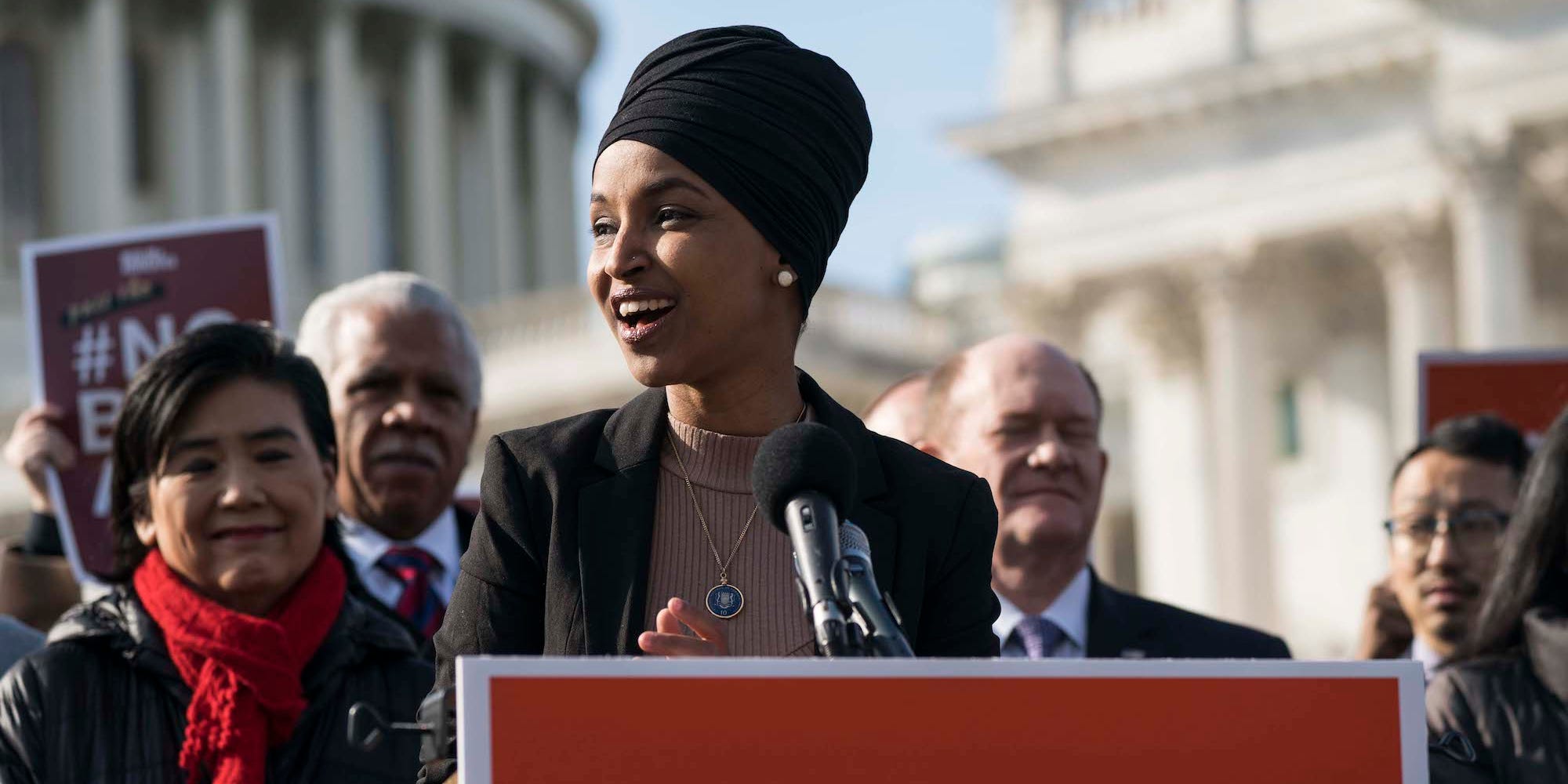
Sarah Silbiger/Getty Images
- Rep. Ilhan Omar, a Minnesota Democrat, handily won a second term this month, but underperformed President-elect Joe Biden by more than perhaps any other Democratic candidate in the country.
- There are a slew of factors that likely impacted Omar’s race, including a third party on the ticket, a supremely well-funded Republican opponent, and the fact that she was virtually guaranteed to win reelection.
- But Democratic operatives and Minnesota politicos told Insider that Omar’s underperformance was largely in line with down-ballot Democrats across the state, who underperformed Biden, particularly in the suburbs.
- Visit Business Insider’s homepage for more stories.
Rep. Ilhan Omar, a progressive Minnesota Democrat, handily won a second term this month, but underperformed President-elect Joe Biden by more than perhaps any other Democratic candidate in the country.
While Biden won 80% of the vote in Minnesota’s fifth congressional district — one of the most progressive in the country — the outspoken congresswoman won 64%, a 14-percentage point drop from her 2018 election.
There are a slew of factors that likely impacted Omar’s race, including a third party on the ticket, a supremely well-funded Republican opponent, and the fact that she was virtually guaranteed to win reelection. But Democratic operatives and Minnesota politicos told Insider that Omar’s underperformance was largely in line with down-ballot Democrats across the state, who underperformed Biden particularly in the suburbs.
A pro-marijuana alternative and a well-funded Republican
Experts chalked up much of Omar’s underperformance to pro-marijuana legalization third parties, which recently achieved major party status and made it onto the ballot this year. The pro-cannabis candidate in Omar’s district won 10% of the vote, most, if not all, of which pollsters say would have gone to Omar.
Donna Victoria, a Democratic pollster, called the third-party candidate the “single biggest factor” in Omar’s underperformance. She said many voters likely felt compelled to vote for Biden given how competitive Minnesota’s presidential race was expected to be, but may have felt more confident in casting a symbolic third-party vote in Omar’s race as she was virtually guaranteed reelection.
"I don't think it's a very sexy answer, I think it's a structural answer," Victoria told Insider. "With Trump insisting he was going to win Minnesota, you weren't going to risk skipping Biden."
Tim Lindberg, a political science professor at the University of Minnesota Morris, said Omar was hurt most by the pro-marijuana third-party, which siphoned votes from Democrats across the state, and the significant money and negative messaging leveraged against her. Like fellow progressive freshman congresswomen of color, who call themselves the "Squad," Omar has attracted outsize national attention — and vilification — over the last few years.
"Whether it was the more xenophobic, racist kind of messages - 'go back to your country,' or whether it was more of a message of corruption or of nepotism, she was really targeted because of her role as part of the Squad and as a lightning rod for Republicans everywhere, but also for President Trump," Lindberg said.
—Dave Wasserman (@Redistrict) November 25, 2020
Her reelection race reflected that dynamic: Omar's Republican opponent, Lacy Johnson, raise almost double the amount of money she did -- $10.1 million to Omar's $5.4 million.
In 2018, Omar's Republican opponent spent just $23,000.
Suburban ticket-splitting
Down-ballot Democrats in Minnesota particularly underperformed Biden in the suburbs.
Minnesota was at the center of the nationwide protests for racial justice and against police brutality. It was George Floyd's death at the hands of Minneapolis police in May that sparked months of Black Lives Matter protests, some of which involved rioting and violence.
Some moderate Democratic voters were likely put off by Omar's call to dismantle the Minneapolis police department, criticism of her campaign payments to her husband, and a series of anti-Semitic remarks she's made. Omar also attracted a well-funded moderate primary opponent, whose attacks likely stuck with some portion of Democratic voters.
Blois Olson, a Minnesota-based political communications strategist, pointed to Biden's success and Omar's lackluster support in the wealthy Minneapolis suburb of Edina — a longtime bastion of country club Republicans that flipped blue nearly a decade ago. Olson argued Omar's underperformance in Edina is an indication that some suburban voters were turned off by Omar's more progressive politics and polarizing profile.
"One of the takeaways is, Democrats can't go that far or they will begin to lose the suburbs quickly," Olson told Insider. "She's a bridge too far for upper middle class suburban voters."

Stephen Maturen/Getty Images
But across the state, Republican state legislative candidates won down-ballot even when the same voters picked Biden over Trump.
This came as voter turnout in Minnesota jumped by about 11 percentage points to a staggering 80% this year — the highest turnout of any state in the country in a year when more Americans voted than ever before.
Biden did much better against President Donald Trump in Minnesota than Democratic presidential nominee Hillary Clinton did in 2016. Biden won the Midwestern state by about seven percentage points — a nearly six point swing against Trump from 2016, when Hillary Clinton won the state by 1.5 points.
Biden ran up his lead in Omar's district, which had among the highest turnout of any in Minnesota.
Omar's spokesperson, Jeremy Slevin, told Insider that Biden's large lead in Hennepin County had much to do with the Omar campaign's get out the vote effort.
Slevin said Omar's general election campaign devoted nearly all of its manpower and resources to boosting turnout for Biden. The campaign primarily worked with the Minnesota Democratic-Farmer-Labor Party, knocking doors even while most Democratic campaigns across the country halted door-knocking during the pandemic.
"We didn't campaign for ourselves after the primary," Slevin said. "Biden vastly overperformed Clinton in 2016 and we're proud of that. That's what our goal was. Our goal wasn't to pad our numbers."
Olson credited Omar, who endorsed and campaigned with Sen. Bernie Sanders during the Democratic primary, with the surge in turnout in Minneapolis.
"That's what she did, she delivers the grassroots," Olson said.

